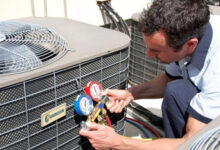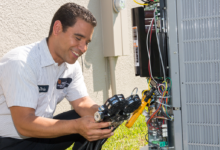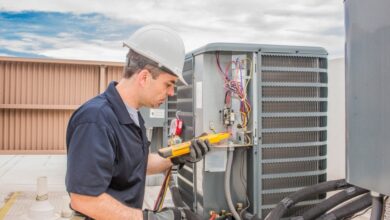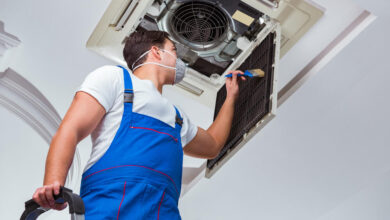Maintenance of AC Unit: A Comprehensive Guide to Ensuring Optimal Performance and Longevity
Sponsored Ads
Preamble: Understanding the Importance of AC Unit Maintenance
Maintaining your air conditioning (AC) unit is a crucial aspect of ensuring its smooth operation, energy efficiency, and prolonged lifespan. Neglecting regular maintenance can lead to a multitude of issues, including decreased cooling performance, increased energy consumption, costly repairs, and premature unit failure. By adhering to a comprehensive maintenance schedule, you can avoid these problems and enjoy a comfortable and energy-efficient indoor environment all year round.
The benefits of regular AC unit maintenance are numerous and far-reaching. Proper maintenance optimizes the unit’s cooling capacity, resulting in a more comfortable and efficient cooling experience. By keeping the unit clean and well-lubricated, you can reduce the strain on its components, extending its lifespan and minimizing the risk of costly repairs. Regular maintenance also helps to improve indoor air quality by removing dust, allergens, and other pollutants that can accumulate in the unit.
In this comprehensive guide, we will delve into all aspects of AC unit maintenance, providing you with the knowledge and instructions necessary to keep your unit operating at peak performance. We will cover everything from basic cleaning and filter replacement to more advanced tasks such as refrigerant checks and electrical inspections. By following the recommendations outlined in this guide, you can ensure that your AC unit provides you with years of reliable and efficient cooling.
1. Regular Cleaning and Maintenance
Importance of Regular Cleaning
Regular cleaning is essential for keeping your AC unit functioning optimally. Dirt, dust, and debris can accumulate on the unit’s coils, fins, and other components, reducing its ability to cool effectively. A dirty AC unit also consumes more energy, leading to increased utility bills. By cleaning the unit regularly, you can remove these contaminants and restore its peak performance.
How to Clean Your AC Unit
To clean your AC unit, you will need a soft brush or cloth, a vacuum cleaner with a soft brush attachment, and a mild cleaning solution. First, turn off the power to the unit and disconnect it from the power source. Then, use the soft brush or cloth to remove any loose dirt or debris from the coils, fins, and other components. Next, vacuum the unit thoroughly to remove any remaining dirt or dust. Finally, mix a mild cleaning solution with water and use a soft cloth to wipe down the unit’s exterior and its various components.
2. Filter Replacement
Importance of Filter Replacement
The air filter in your AC unit plays a crucial role in maintaining indoor air quality and protecting the unit’s components from dirt and debris. A dirty air filter can restrict airflow, reducing the unit’s cooling capacity and increasing its energy consumption. It can also allow dust, allergens, and other pollutants to circulate throughout your home, leading to respiratory problems and other health issues.
How to Replace Your Air Filter
Replacing your AC unit’s air filter is a quick and easy task that should be performed every month during the cooling season. To replace the filter, simply locate the filter compartment, which is usually found on the side of the unit. Open the compartment and remove the old filter. Then, insert the new filter into the compartment, ensuring that the arrow on the filter is pointing in the direction of airflow.
3. Refrigerant Checks
Importance of Refrigerant Checks
Refrigerant is a vital component of your AC unit, as it absorbs heat from the air and releases it outside. Low refrigerant levels can lead to decreased cooling performance, increased energy consumption, and premature compressor failure. Regular refrigerant checks are essential for ensuring that your AC unit has the correct amount of refrigerant to operate efficiently.
How to Check Your Refrigerant Levels
Checking your AC unit’s refrigerant levels is a task best left to a qualified HVAC technician. However, you can perform a simple visual inspection to identify any potential leaks. Look for any oily residue or discoloration around the refrigerant lines or connections. If you notice any signs of a leak, contact an HVAC technician immediately.
4. Electrical Inspections
Importance of Electrical Inspections
The electrical components of your AC unit are critical to its safe and efficient operation. Electrical problems can lead to a variety of issues, including decreased cooling performance, increased energy consumption, and even electrical fires. Regular electrical inspections are essential for identifying and addressing any potential electrical problems.
How to Perform an Electrical Inspection
Performing an electrical inspection of your AC unit is a task best left to a qualified electrician. However, you can perform a simple visual inspection to identify any potential problems. Look for any loose










